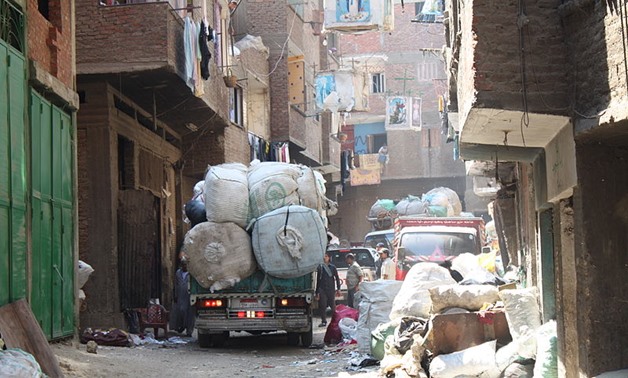
A garbage truck driving through the Streets of Manshiyat Nasser, Mokattam, Cairo - Courtesy to Wikimedia Commons
CAIRO – 29 April 2018: Landfills that have increased in size over years in Egypt are subject to plans that would see them turned into recycling centers. It is a plan that the government has deliberated several times, but this time the funding has been secured.
During an inspection of garbage dumps in the Delta’s Menoufia on Friday, Minister of Environment Khaled Fahmy said that the ministry will receive the funding in July.
He added that Menoufia’s Abu Kharita, the biggest landfill in Egypt, will be replaced by the largest recycling plant in three months.
“The University of Alexandria will implement a plan for the disposal of the landfill, and we will provide experts to work on waste sorting,” Fahmy said.
“There is no society free from garbage, but we aim to solve the problem of waste within four years. Once a new law [on garbage disposal] is passed by the House of Representatives, a company will be selected to run the processes of disposal,” he added.
“Sell your garbage,” a project launched by Cairo Governorate in early 2017, aims to establish kiosks in different neighborhoods where people are encouraged to sell their used cans, plastic bottles, paper and cardboard instead of throwing them away. It began with two kiosks in the Heliopolis district in Cairo, and other kiosks are being prepared in other locations in the governorate.
On the other hand, the informal sector recovers 2,567,143 tons of waste annually and recycles over 80 percent of what it collects, making annual sales of up to LE 197.5 million. The formal sector, on the other hand, recovers 810,667 tons, of which it recycles only 45 percent, according to a 2007 study by the German Technical Cooperation and the Switzerland-based Collaborative Working Group on Solid Waste Management in Low and Middle Income Countries.
The key stakeholders in waste management include both the formal sector (the central government, local government, ministries, formal small private companies, national and international donors, commercial waste generators and residents and non-governmental organization) and the informal sector (traditional garbage collectors locally known as zabaleen, scavengers, middlemen and intermediary buyers/dealers and wholesale merchants of items from scavengers).


Comments
Leave a Comment